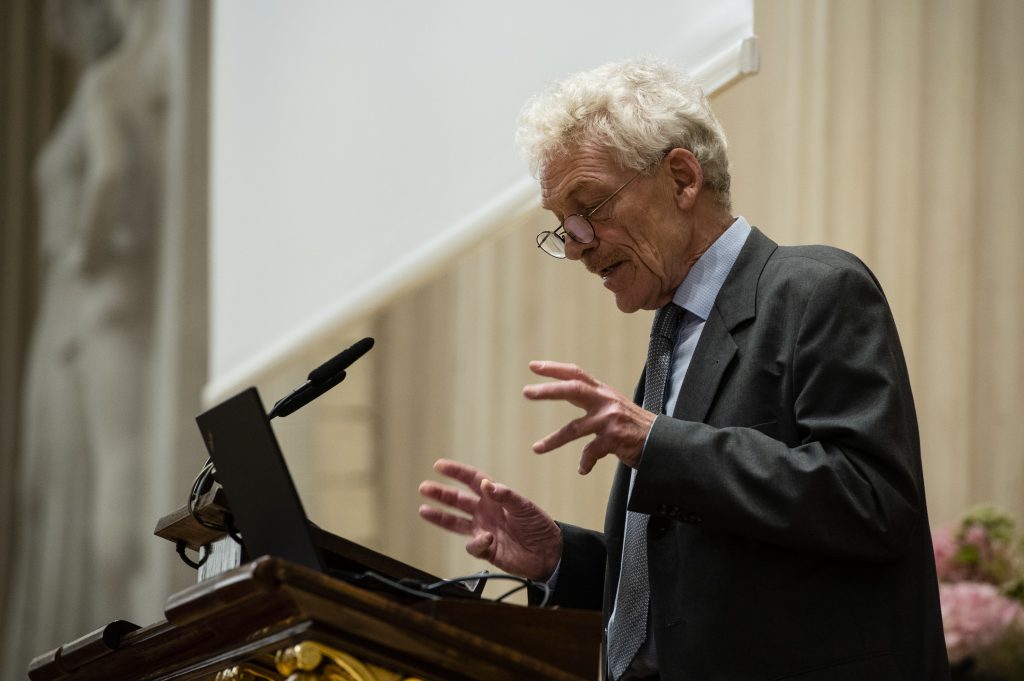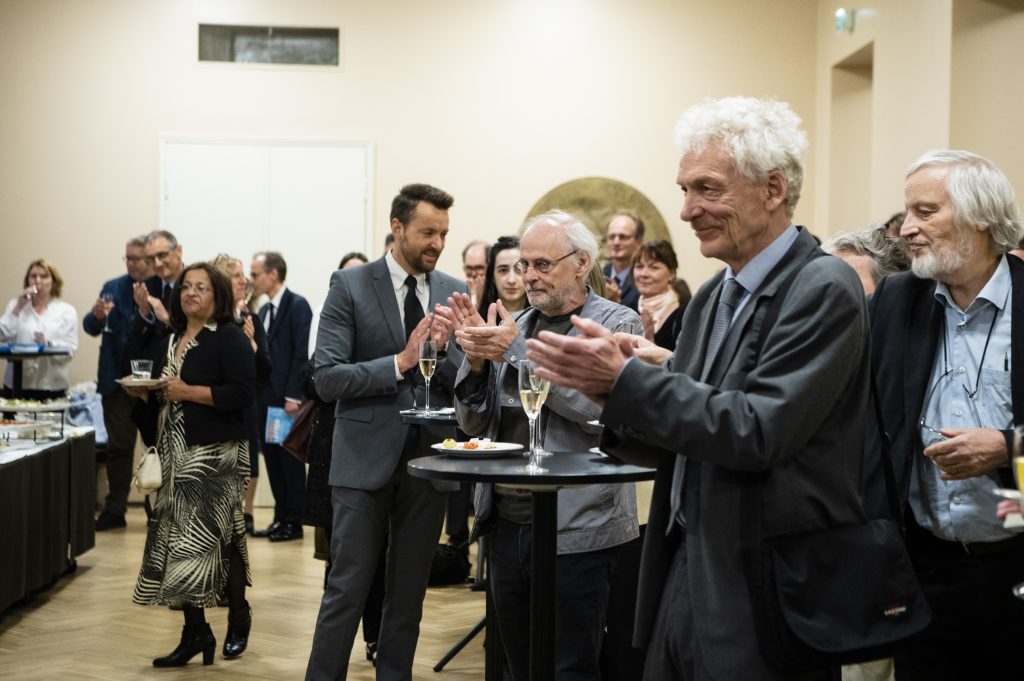By Morten Kyndrup, professor, Aarhus University, HCAS Advisory Board Member, former president of UBIAS (University-based Institutes of Advanced Study), former Executive Director of the Aarhus Institute of Advanced Studies

Professor Kyndrup’s speech was delivered at the 20th Anniversary Celebration of the Helsinki Collegium in the Festive Hall of the University of Helsinki on June 15, 2022. (Photo: Veikko Somerpuro)
It is an honor and a pleasure for me to convey my greetings today on the occasion of this 20 years birthday of the Helsinki Collegium for Advanced Studies. So first of all: Congratulations on the anniversary!
One might ask: Why celebrate such an occasion? There is nothing really honorable about age in itself. Everybody acquires age over time! What counts, of course, is what you have achieved, what you do, and how you do it. This indeed applies to Institutes for advanced study.
I am not going to repeat today the beautiful story about the rise and development of the phenomenon of institutes for advanced study since the first one was created in Princeton in the 1930’s – in fact based on an amalgamation of two different European University traditions, the British Oxbridge system based on colleges, and the continental Humboldt-tradition of free, individual research. As such, a nice example of import-export, since this American invention inspired by Europe was subsequently re-exported back to Europe and to the whole world. Moreover, the idea of institutions like institutes for advanced study has spread increasingly fast over the last 50 years.
Why, one might ask? This is another long story. But at this occasion two points should be emphasized (to avoid widespread misunderstandings): First of all, institutes for advanced study were never thought of as alternatives to the ordinary university systems, but exactly as tiny supplements, exceptions, lacunas, with space to work and to meet with, temporarily, top notch colleagues from other disciplines under alternative circumstances. And secondly: Meeting not in order to turn disciplines into interdisciplinarity, but to let disciplines fertilize each other in their proper disciplinarities respectively. The two are by no means the same thing.
Anyway, the idea of institutes for advanced study is not an easy one to realize. It certainly produces “structural difficulties” to be a permanent, marginal exception to an overall system – especially if that overall system owns you. Unfortunately, such difficulties have led many universities worldwide to opportunistic shortcuts. Over the last decades, many institutes have been launched under the name of “advanced study” without actually fulfilling the criteria for or following the tradition of such institutes. There are quite some examples of initiatives, which have aimed at profiting from the IAS-connected prestige without actually engaging in the necessary endeavors to create such an institution, being, literally spoken, just a sign on the wall, a name without any real substance. I have seen – and visited – institutes with just a couple of fellows, institutes with local fellows exclusively, and institutes which were in fact nothing but a university’s visiting program or a traditional disciplinary institute just under another label.
Now this is why two international network organizations, the UBIAS (University-based institutes of advanced study worldwide) and the NetIAS (A European network of institutes) were created, both with stringent membership criteria (grosso modo identical) concerning institutional status, admission criteria, kinds of fellowship programs, scientific independence etc.
This brings me back to the good reasons for celebrating the Helsinki Collegium on its 20 years anniversary today: Here in Helsinki no shortcuts have been taken. The Helsinki Collegium is a real “classical” institute for advanced study, and as such, it is a core and distinguished member of both international networks. Like any other institute for advanced study, the Helsinki Collegium has led a life full of dangers and obstacles, because that is how it is to be a small institutional, permanent exception in the margins of a much bigger system. But the Helsinki Collegium has stuck to the principles, has built up and preserved its status as a genuine institute for advanced study. As such, the Helsinki Collegium has been an ideal to many of its sister-institutes worldwide. When I myself was about to create the foundation for AIAS, a new institute in Aarhus, some 12 years ago, I traveled around to learn from existing institutes. The first three I visited was the WiKo in Berlin, the SCAS in Uppsala, both much older, well-established institutes, and the Helsinki Collegium, by then less than 10 yrs old.
Over the years, I’d like to add, a close and fruitful cooperation has been flourishing between the AIAS and Helsinki Collegium – at staff level, between fellows and of course between directors, bilaterally and in the international networks. At this occasion, I will take the opportunity to thank the Helsinki Collegium warmly for this cooperation on behalf of AIAS and Aarhus University.
All in all, there are indeed good reasons for celebrating this anniversary of the Helsinki Collegium. Not because of age, but because of the institute’s achievements as a genuine, classical institute for advanced studies. The Helsinki Collegium has developed itself and thrived in spite of occasional hard times and difficult conditions. On top of that, the Helsinki Collegium has also contributed substantially to making the very concept of these institutes thrive and evolve internationally.
Achievements like that are of course not signed by the walls of the building. They are the result of ongoing endeavors of the staff, of the board members, and not least of the fellows of the Helsinki collegium. Nothing comes out of nothing, and real world achievements certainly do not.
So, congratulations to the Helsinki Collegium, to all of you behind these achievements, no one named, no one forgotten. But I can think of at least a handful of living persons, having over the years done the most honorable, determined efforts to make this come true.
However, I would also like to congratulate University of Helsinki on this occasion. You can be proud of the Institute for advanced study you have created. It contributes immensely, not least symbolically to your reputation as one of the world’s leading classical universities.
The Helsinki Collegium is a distinguished member of the leading international networks of institutes for advanced study. I am confident that I can extend my greetings today to be on behalf of also NetIAS and UBIAS.
Finally, as we do on anniversaries, I wish you a long and healthy life in the times to come. I can promise you that it is not going be easy. However, I am confident that you will survive, develop yourself and thus remain among the best, classical institutes for advanced studies worldwide.

(Photo: Veikko Somerpuro)